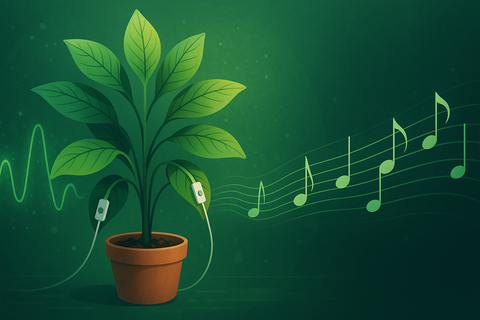Have you ever felt that your plants are trying to tell you something? Maybe they perk up when you enter the room or seem to droop when you're away. While it might sound like a whimsical notion, there's a fascinating field of study that explores the electrical signals in plants, suggesting they might be more responsive than we once thought.
📡 The Science of Plant Electrophysiology
Electrophysiology is the study of electrical properties in biological cells and tissues. In plants, this involves monitoring electrical signals that occur in response to various stimuli—like light, touch, or injury. These signals play crucial roles in processes such as growth, defense, and adaptation to the environment. Recent studies have shown that plants can exhibit rapid electrical responses to stimuli, indicating a complex internal communication system .
🧠 Cleve Backster and the Idea of Plant Perception
In 1966, Cleve Backster, a polygraph expert, conducted an experiment that would spark decades of curiosity and debate. He connected a Dracaena plant to a polygraph machine to observe its reactions. To his surprise, the plant exhibited electrical responses when he merely thought about harming it. Backster termed this phenomenon "Primary Perception," suggesting that plants could sense human intentions .
While Backster's findings were controversial and faced skepticism from the scientific community due to challenges in replication and methodological concerns, they opened the door to exploring plant responsiveness in new ways.
🎶 Enter PlantChoir: Giving Plants a Voice
Inspired by the intriguing possibilities of plant perception, we developed PlantChoir—a device that measures the electrical activity of plants and translates it into music. By attaching sensors to a plant's leaves, PlantChoir detects fluctuations in electrical signals, which are then converted into harmonious sounds. This not only provides a unique auditory experience but also offers insights into the plant's responses to its environment.
For instance, changes in light, touch, or even your presence can influence the plant's electrical activity, leading to variations in the music produced. It's a beautiful way to connect with nature and become more attuned to the subtle ways plants interact with the world around them.
🔬 The Ongoing Exploration
While the idea of plants sensing human thoughts remains a topic of debate, the study of plant electrophysiology continues to reveal the intricate ways plants perceive and respond to their environment. Devices like PlantChoir serve as tools for both education and research, allowing us to explore these responses in real-time and fostering a deeper appreciation for the complexity of plant life.
🌱 Join the Conversation
At PlantChoir, we're passionate about bridging the gap between science and nature. We invite you to join us on this journey of discovery. Whether you're a researcher, educator, or simply a plant enthusiast, PlantChoir offers a unique way to engage with the plant kingdom.
Experience the harmony of nature and technology. Let your plants sing.



